[INTERVIEW]
Bianka Kunicka Chudzikowska: For me, writing is more than a passion, it is my air.
- December 29, 2020
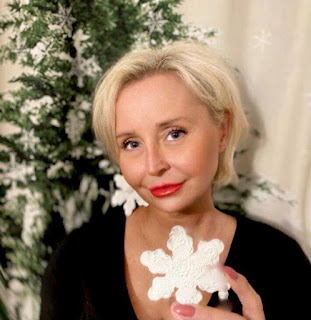
Here is our guest: cultural expert, artist, iconographer, and at the same time a poet and writer. In a word: a one-of-a-kind woman with many faces - Bianka Kunicka Chudzikowska.
Considering this presentation, I would like to start our conversation with an attempt to define a woman, after all, you are, in my opinion, the clearest proof that it is not easy to include her in a cultural framework. So how do you perceive women - and thus - the view that they are the weaker sex?
A difficult question, because looking through the prism of history, it is undoubtedly a woman and her position in society at the turn of the century changed a lot. Today it is hard to believe that until relatively recently women did not have the right to vote, the right to decide about themselves or to be educated. Apart from the fact that to this day our world is very patriarchal, and the times we live in show that we are still deprived of our voice on many levels, or at least try to, at the same time I think that women, despite being called the weaker sex, often controlled and subjugated the seemingly stronger one. A big problem was also the fact that women did not support each other, but this is also changing, because they understood that only by acting together, they have a chance that their needs will be noticed and their rights respected.
to the same here I do not want to devalue the attitude of men here, because they also have a mature awareness that a woman is not only the mother of their children, whose greatest ambition is to run a household, but above all a partner who has the right to personal development. As for femininity itself, it's hard to disagree with the words of Nietzche that whatever is said about a woman is true. But seriously - femininity, apart from the sexual aspect, is primarily the awareness of your inner strength and what is its essence. In the past, when multi-generational families lived together, a lot of wisdom, advice, as well as warmth and love, somehow spontaneously passed from generation to generation, and today this tradition has actually disappeared, because most young people, following work or education opportunities, leave home very quickly family. Importantly, you need to grow up to be willing, but also to have the courage to show female emotions and draw strength from them. Conscious femininity is an extraordinary value that allows you to draw on primal instincts, such as intuition, allowing for a non-analytical understanding of the world, its rhythm and pulse, and thus mitigating the consequences of the fact that it is constantly accelerating.
You say about yourself that you have been writing for as long as you can remember. So, should we look for the first attempts at arranging letters on the pages of children's notebooks? What gave you the opportunity to write at that time?
Yes, my first poem was very, very serious. It was created when it was less than six years old, although I'm not sure if it was ever recorded. I invented it for miners for St. Barbara's Day and I really have no idea where the idea came from, because not only did I not have anyone in my family who worked in the mine, and I have never seen a miner in a formal costume.
I don't remember any other poems from that period, but the next one I remember was written about Gross Rosen, a concentration camp. So, as you can see, it was very involved poetry, and I will add that I know both of them by heart. High school is a lot of next poems, but only its end and studies gave birth to a really large amount of texts. At that time, I wrote mainly about feelings and only for the drawer. It was a time of rebellion, noticing the ugliness of the world, but also an attempt to understand and tame one's own emotions, mainly love, of course. It was writing for myself, probably an unconventional kind of therapy for maladjustment. My poems and stories have always been lined with sadness, longing, fear of rejection, which I could only express in a somewhat veiled form.
Some people think that ideas for writing come to them while they sleep. Can you confirm this, and if not, list the circumstances when they occur?
Analyzing the specificity of human sleep based on brain activity, and especially its phase REM, one can probably try to justify such assumptions. The human brain then processes the information and arranges it into some logical whole, giving meaning to the chaos. Freud would have been happy to see this as hints of the subconscious. Jung would go on to say that in dreams we encounter symbols common to humans. Unfortunately, I don't know if I can confirm this, considering that I never remember my dreams, and I usually write at night. Generally, I suffer from insomnia, although I must admit that I don't like that term, because I don't suffer from insomnia at all, but I'm having a good time. It is at night, when everything slows down, that I like to write the most. I am aware that it is not very beneficial for health, everyday life, but also for appearance. Unfortunately, I have tried many times to change it and failed.
Ideas are an impulse, they can appear at any time. Of course, it is different with prose, where they are born, germinate slowly, and differently with poetry, because in it it is usually a spark that ignites subsequent lines. Words run by themselves, but I like to have an idea, I like to know where they are supposed to go, what I want to say through them. Most often I sit at an open file entitled "ideas for poems" in which I have notes, but I never really use them, because the earlier, then seemingly brilliant idea, not written right away, ceases to be interesting.
That's why it happens to me that I sit down and history is made at that exact moment. I think that emerging ideas, or writing itself, is an inner need of people who share a similar sensitivity, a similar kind of inner sadness, eternal longing for who knows what. Perhaps writing gives us a substitute for fulfillment. To paraphrase the aforementioned father of psychoanalysis, Sigmund Freud, a happy person will never be addicted to fantasizing. So maybe writing is a substitute for happiness.
It is said that people are the sum of the books read in a lifetime. What shaped you influencing the choice of a complex poetic and prose path?
I don't know if I should admit it, but my favorite activity in childhood, and not only in childhood, was reading the encyclopedia at night. I just picked a page at random and read password after password. I've always been very fond of fairy tales and poetry, and when it comes to novels, maybe it's not very original, but I was reaching for the classics. I read a very diverse literature, because of Emil Zola, Marquez, Umberto Eco, Vonnegut, Fowles, Proust, Pilch, Tokarczuk, Zafón, Hłaska, Myśliwski, and from the poetry of Pawlikowska - Jasnorzewska, Przerwa - Tetmajer, Wojaczek, Leśmian, Zuzanna Ginczanka, Norwid, Tuwim , V. Voolf, Yetas, Blake, E.A. Poe, Yesenin, Tsvetaeva, Rimbaud, Baudelaire, Varlaine, Plath.
No, I am not able to mention the names whose words made me fall in love with myself and I am already stressed that by giving them spontaneously, I must have omitted many important ones. However, apart from poetry and its metaphorical message, I was definitely impressed with Kapuściński's Lapidarium cycle and its large, multifaceted understanding of world, full of humility and tolerance, and at the same time extremely penetrating and very direct.
The poet Wanda Dusia Stańczak wrote the following words: Do not hide your words/ You can use them to light a much-needed lantern. Is this also the reason why you create and how do your loved ones view this passion?
Yes, it's hard to disagree with these words, not only in poetry, but on every level of life. What distinguishes us from all other creatures is that we can communicate with each other to a degree that allows for the exchange of thoughts, dialogue, and thanks to this we shape our views. Every interaction, including reading literature, brings a new perspective and broadens horizons. I needed literature to understand that people, although they differ in culture, place of residence, origin or age, really have similar dreams and needs, I am talking about non-material ones here. Probably the most beautiful words that sometimes reach me are those that someone had a very bad time, that they suffered due to personal or health problems, and my poetry or prose helped them get back on their feet, because it touched their inner, usually unspoken he thinks he found the strength in himself to put many things in order.
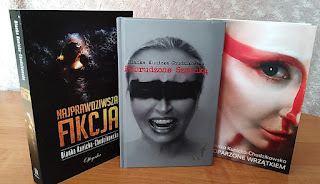
As for the second part of the question, of course my loved ones support me and understand that writing is more than a passion for me, it is my life.
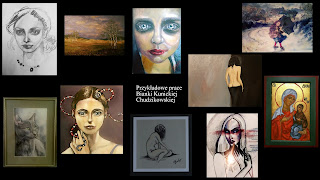
You write icons, poetry and prose. Which type of writing requires the most intellectual effort, or maybe it's just a matter of multidimensional talent and openness to broadly understood art?
I can't choose whether it's poetry or prose, because it's a different way of thinking, a different rhythm and way of writing. In poetry, you have to condense your thoughts, which is often a big obstacle, and when writing prose, you can let them flow freely. The hardest thing about all this is jumping from one literary form to another, and constantly. When I write a novel, I miss poetry almost immediately, and I miss prose when I write poetry. I wouldn't be able to give up any of these paths now. Poetry has the advantage that it is an incomparably shorter form, and although writing a volume containing several dozen, and sometimes over a hundred poems often takes more time than writing a book, it does not have to form a logical whole as in a novel and does not require as much self-discipline. Finding inspiration in writing a poem is definitely easier than writing a text of several hundred pages. It can be really hard work, which you often have to force yourself to do, and stopping writing for a long time causes you to break your rhythm.
As for the icon, I approach its writing purely as a hobby, I am fascinated by the technique of its creation and history, but compared to writing, I treat it very little and it will certainly always be so, because my medium has always been, is and will be the word.
Do both poetry and prose involve sticking to the assumptions you defined at the beginning, or, on the contrary, do they sometimes allow you to feel the call of freedom and the joy of being spontaneous?
Surely there must be an idea which in the case of poetry can be an impulse. To be honest, using a metaphor, I usually reach my goal, but usually in a different way than I planned, but this is one of the most fascinating elements of writing, because otherwise it would probably be boring. We discover ideas, solutions and stories within ourselves that come suddenly and shuffle the previous ones. I like it very much, because it shows how our brain can surprise us with the form of expression, creativity, the amount of coded information that we can suddenly combine into a logical whole. One could even be tempted to say that the most fascinating thing about writing is this free stream of thoughts, when we become demiurges, creating alternative worlds.
I came across your poetry for the first time in 2018, when I got my hands on a book called. Stained with lipstick, and a year later another titled Scalded with boiling water, which in my opinion cemented your high position in the field of poetry. You manage to gather around you many people fascinated by the works, and expressing this with a sea of reactions and comments on your Facebook profile, or even willingly co-creating the radio show Unicode of Poetry recently broadcast on Radio Ty i Ja. Can you explain it somehow, especially since Poles rarely read poetry...?
For me, it was a huge surprise, and initially it was even a shock, but a positive one that motivated me to continue writing. I think that, contrary to popular opinion, poetry is needed, but at the same time it is quite difficult to access. Contemporary poetry is not promoted the way new novels are. Even well-known names usually occupy a tiny bookcase in a bookstore, where we find hundreds of shelves with prose. In addition, books are generally expensive, and volumes of poetry are usually less extensive in form.
I noticed that liking for my poetry often ends when you have to pay for the volume, but at the same time I see how many people are hungry for feelings and talking about them. They seek beauty, because the enormity of ugliness and violence around them causes discouragement. A poem can resurrect long-forgotten emotions in the reader and speed up the heartbeat in a fraction of a second. Isn't it beautiful?
Noteworthy is the fact that the last volume contains over a hundred songs. Out of all the ones you've outlined so far, can you pick your favorite one?
I certainly have favorite lyrics, but I wouldn't want to, and I don't think I could even point to specific ones at the moment. There are so many poems that I just don't remember them. First of all, I don't remember the titles, which, as if by magic, arise suddenly, unexpectedly for myself, and in addition they do not necessarily result from the content of the poem. Often asked about a specific title, I can't associate the poem it refers to. Maybe in this, somewhat twisted way, I evaded the answer, but it is a conscious avoidance of assigning one of the poems as the closest to me.
I must admit that I also succumbed to the spell of your work, but it was mainly because of your debut novel entitled The truest fiction, awarded with the silver laurel of the 2nd edition of the independent poll for the Polish Book of the Year Missing Litera , which I lead, as well as the recognition of the Eighth Juror in the readers interested in the competition. How do you remember this award? Has it influenced your willingness to climb the ladder of success?
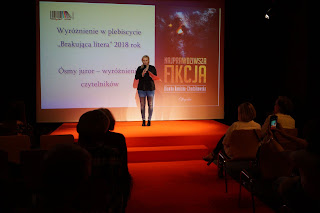
Yes, of course, right after the end of the third stage of the competition, we met. I clearly remember the message I received right after the competition closed, when we spoke for the first time. Today I am in a different place and time, with a different awareness and ideas, but that moment and participation in the competition will always be important to me. I completely did not expect that my premiere book, which was published just before the plebiscite, could be awarded. Of course, every writer hopes something like this will happen, and it's hypocritical to say otherwise, but it's hard to expect that to happen right after debut. The award itself gave me faith in the sense of what I do and a huge, motivational kick and will always have a symbolic meaning for me.
Do you reward yourself in any way, even symbolically, for the efforts of creating yourself?
I don't know how to interpret this question at all, but I don't think I'm doing anything that would fall under the definition of rewarding myself. For me, the reward is the very fact that I can write, that I have the ease of speech and, in addition, I have my readers who motivate me and they reward me with a good word or just the presence. I met many people personally, with some of them our relations became even friendly. Thanks to what I do, I have met people that I would not have had the opportunity to meet under normal circumstances, and yet one of the greatest values in life is to be able to be close to people who think and feel similarly. So the fact that this happened to me is a reward in itself.
The main stimulus for this conversation is the upcoming December premiere of the second novel published under the wings of the Oficynka Publishing House - For the ages of ages Pani Amen. Where did the idea for such an original title come from?
Titles are independent creations that must live not only in symbiosis with the content of the novel, but also independently of it, because their role is to attract a potential recipient. I like giving titles, I like wordplay and their ambiguity, and sometimes also provocation. The novel talks about a woman who is unable to love, and the whole story aims to explain the reason for this state of affairs, which often leads to the times close to the birth of Christianity. I will not reveal the details, because it could spoil the element of surprise, so I will just say that the title certainly refers to the mentioned fact, but also to the subject of faith, or lack of it, and the word "amen" itself in many of its dimensions.
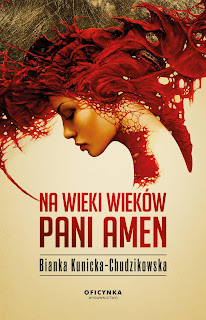
At first glance, the cover of the book attracts attention because of the magical painting by the artist, Karol Bąk. You can see that painting is once again infiltrating your prose output. Was this a procedure intended from the beginning?
Yes, definitely intentional, because the visual side of everything I do is very important to me. In every field of art, the most important thing is the recipient, and thus his imagination, and it should be taken into account that everyone will perceive a given work or text in their own way. This is influenced by his experiences, aesthetic preferences, but above all by what bothers him at the moment, worries him, brings joy or sadness. Despite that, I like to nudge him a bit. The illustration I choose imposes a look, is in line with my ideas, and this certainly completes the whole.
Karol Bąk is an extraordinary artist, and the image on the cover is extremely suitable for the title character, red-haired Małgorzata, whose story is, I believe, equally dynamic. I was very pleased when Karol immediately agreed to have his image used on the cover of the book.
Thanks to your kindness, I had the opportunity to get acquainted with the novel long before its publication, and I admit that I was actually struck by Małgorzata, the main character's inability to love. So it seems reasonable to ask: what is the art of loving based on?
Well, yes, I expected a similar question, and I might even add that I was a little afraid. I don't know what the art of love is, but I know for sure that love is an art in its purest form. With Emily Dickinson, I can say that love is everything and that's all we know about love. Some say that it is a disease, and even suffering with pain, but probably everyone would like to get seriously ill with it.
The heroine of my novel, Małgorzata, has a morbid desire to love because she has never experienced this feeling, which in her opinion makes her handicapped, worse, and she tries to discover what her specific dysfunction is. I don't want to reveal the plot, I will just add that life can be unpredictable...
When the idea for this story sprouted in your head, did you also want to shake the reader to the core, and at some stage of writing do you get the feeling that you are creating something important?
I don't think I can say that I've ever consciously tried to shock anyone, but if I managed to achieve such an effect, I'm very happy. I never feel that I am creating something important, but I always know what I want to convey and somewhere inside I feel and want to believe that I have something important to say. After writing my first novel, I used to receive letters from readers, because they were mainly women, that the book influenced their way of thinking, perception of reality, or helped to look at many problems from a distance. These are priceless letters and important moments for me, because they confirm that my story has served its purpose.
I dare say that the current story is more mature. The first novel was created as a result of some inner need and although it wasn't about me, it contained a lot of my personal reflections. In Forever and ever, Lady Amen apart from emotions, the story itself is much more complex.
By analogy to True fiction, Gaja also appears here, but this time in the person of Łysa - a hospice patient. This is an intriguing discovery, because the novels, although different, seem to magically intertwine one into another... so, Mrs. Bianka is not only a painter, poet, writer, but also a sorceress?
Of course, not also, but mostly. I enchant the world, I curse reality, I seduce with words, I pretend, I bend the truth, I create new space-times. There is probably no greater magic than the word and its power, because it is a medium without borders, just like our imagination, because it also has no borders. Every other field of creativity imposes some kind of visual or auditory reception, and the word does not have it. In written works, everything is subject to arbitrary shaping, there are no templates, no imposed schemes. The only framework is the ongoing story, but the world, characters, their appearance, or voices are created by the readers. They are the co-creators of space and characters. It's beauty, it's magic that really happens.
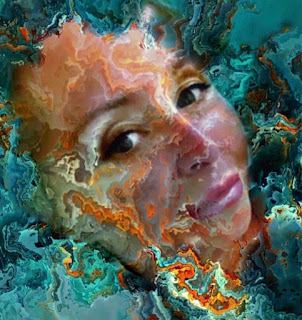
In my opinion, it is unusual, because under the cloak of magical realism you smuggle knowledge in the field of medicine, specifically neurology, touching on the issue of mirror neurons responsible for empathy and compassion, which seem to be a scarce commodity, or maybe I'm wrong?
I am a layman in this field, but at the same time I try to transfer the subject of my interests to the novel as much as I can. They will always be slightly philosophizing or psychological, there will always be elements of medicine, history of art or magic in them, although in a sense science is also science, and perhaps it is science above all. In our consumerist, egocentric world, there is less and less room for empathy and feelings, so I think it's worth writing about. There is a noticeable increase in the number of people with autism or Asperger's Syndrome, and even sociopathic or narcissistic personalities.
The topic of the presence of mirror neurons and their functions is quite debatable, undermined by many scientists, but my book is not scientific or medical literature. The mirror neurons themselves were so named due to the fact that they were supposed to reflect, as in a mirror, not only the behaviors, but also the emotions of another person through the person observing the former, such as fear or pain. It was then found that it helps in understanding others by correctly reading their emotions and feelings. Studies have shown that these neurons are most active in people who are highly empathetic. Going further in this way of deduction, it can be assumed that an extremely important moment in human development is childhood and observing the behavior of parents, mainly mother, because it is she who teaches social behavior. It was noticed that people affected by autism are characterized by lower activity of mirror neurons, although to this day it is not known whether their lower activity causes autism or whether autism affects this brain function. Similar theories have been made about people with psychopathic personalities, who are characterized by a lack of empathy and, consequently, an inability to sympathize. However, what I emphasize once again, the aforementioned functions of mirror neurons are questioned by many scientists, and the available knowledge, unfortunately, is mainly speculation and we will certainly have to wait a little longer for some constructive conclusions.
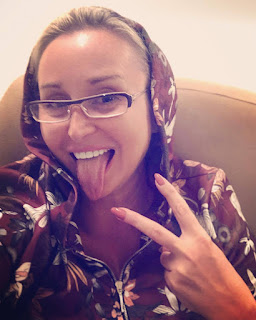
On one of the pages of the novel we can read: Sometimes love is a war, and one where you can't see the wounds, because you hurt the soul and it doesn't heal. So it could be argued that the only antidote for the pain of the soul is just this feeling, and what about friendship? Can it soothe the heartache without being a substitute feeling?
Friendship and love are very close feelings, because they are basically based on the same values, except that friendship does not concern the sensual, sexual sphere. Both are, if I may say so, the work of both parties, and in both, neglect is the most destructive element. Both involve giving the other person time and interest, but at the same time it is a kind of exchange of those qualities that the other person does not have. When one party is a "giver" and the other is only a "recipient", there is no chance of success. Of course, we are talking about intangible things here.
Friendship can soothe a heartache, but it will certainly not replace love, because an extremely important sphere of love is touch, which friendship by definition is deprived of.
Analyzing the heroine's attitude, I came to a sad conclusion, namely: each of us, regardless of gender and job, is a bit of Małgorzata, because we also often feel that it is difficult for us to muster warm feelings. So, paradoxically, in the era of the coronavirus pandemic, do we have a chance for closeness while being far apart?
Whether they are difficult to muster, I am not sure, but it is certainly increasingly difficult for us to admit to them. The coronavirus undoubtedly makes it difficult for all of us to have face-to-face contact. This is somewhat compensated by the available technology. Paradoxically, these social media, often condemned earlier, have become a rescue. I myself used to be skeptical about this form of contact with people, but life has verified my position and thanks to them I have met a lot of extremely valuable people whom I would not have been able to meet in other circumstances.
When it comes to feelings, a wise man once said that distance is to love what wind is to fire, so it feeds the great and quenches the small. Perhaps many relationships will fail this test, but the ones that survive will prove that it was worth investing in them.
I suppose that the authors endow the book characters with their own personality traits. What special gift did Mrs. Małgorzata Amen receive as a gift?
Maybe I will immediately emphasize that I know how to love and that's what makes us different from the heroine. Since this is an elementary skill for humans, determining in one way or another most of our actions, we would have no chance to understand each other. Both of us, on the other hand, are certainly sarcastic and stubborn, but we also know how to listen. I have heard several times that Małgorzata, despite the fact that she is completely different from me, at the same time it is hard to resist the impression that there is a lot of me in her. I think, however, that what sometimes makes us similar is the kind of expression, the way of talking, or maybe a trait of eccentricity and a weakness to provoke, fueled by curiosity about the world and the eternal question of what is on the other side of the river.
Małgorzata was equally interested in the subject of goodness and love. Should a man be condemned because of his inability to love? Where, in your opinion, is the borderline of considering him good or bad? Or maybe we are just half-hearted, after all, there are no perfect people?
Of course, there are no perfect people, just as the concept of good and evil is relative. Very simplistically, I can say with Rousseau that by nature man is lonely, and therefore he is neither good nor bad.
Personally, I believe that man is by nature an animal, a predator who cares about his own safety and the continuation of the species. Then it's not ethical. It is only as a social being that he acquires the features of "humanity". At the same time, ethics alone is not enough to tame his predatory nature, which forces him to constantly fight for power, whatever it is at the moment. Following Foucault, who created the idea of the panopticon, I dare say that a man, in order not to do evil, must be controlled by means of supervision techniques and penal institutions. Although the most beautiful and unusual in man is his, often extreme, dualism, because only man can be selflessly good, but only he hates so selflessly. However, in order not to end this answer in a sad tone, I will add after Oscar Wilde: It is absurd to divide people into good and bad. People are either charming or boring.
However, returning to the first part of the question - no, the inability to love is not a determinant of human worth. You don't have to love to be a decent person, just respect others and treat them as you would like to be treated yourself.
I cannot omit the fact that the plot also touches sensually, and perhaps above all, the sphere of the sacred, referring to Saint Margaret of Antioch, who became famous for defeating the dragon, and to the fourteen helpers, including Cyriacus - deacon and martyr. What prompted you to explore this topic, because it was not faith and the desire to venerate the saints?
Honestly, I don't know how it happened. I had the idea of the novel outlined in my head, but the idea of having fourteen Holy Helpers in it was not intended beforehand. He was born while writing. Perhaps, while collecting materials, I came across the history of their cult and it turned out that quite close to Wrocław there is a church that used to be dedicated to them.
Certainly it had nothing to do with my worldview, because I am an agnostic, but with a cultural inclination it was. As I delved deeper into the subject, it drew me in more and more. I will also add that the historical elements described in the book are included with respect for the facts and most of them refer to actual events, sometimes only slightly stretched for the sake of the plot. I decided that the topic of these fourteen saints is interesting enough to make them the secondary characters of the novel. I am happy to be able to bring it to a wider group of people. However, I immediately emphasize that not everyone may like it, because the book contains anti-clerical elements, although I hope not iconoclastic.
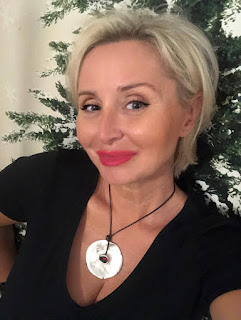
You can risk a statement that the lead in Forever and ever, Lady Amen is equally led by magic, hope and fate, which you combine and ... tame. Do you think that this familiarization and acceptance of what fate will bring is the key to being happy?
Certainly it is difficult, and even pointless, to fight something over which we have no influence, and fate often confronts us with such situations. Hope itself is magic, because dreams are a premonition of our possibilities. There is magic in all of us, it's just a matter of knowing how to see it. We will succeed if we do what we love, be close to people with whom we understand each other and if we dare to give up what does not serve us, what weakens us, from the company of people who eat our energy.
However, I do not recommend unconditional surrender to fate, because we can be deeply disappointed. You have to be able to reach for your dreams, although it takes courage. And we are so often hypocrites because we complain that we lack something, and we can't take a risk and reach out for something that is within our reach. We are stuck in a safe unfulfillment, because we are afraid of losing what we have, in which we have learned to function quite well, but, in panic, we are afraid of what we do not know. I will also add that, unfortunately, I do not know the recipe for being happy, but if there is one somewhere, I would love to know it.
Let your imagination run wild and assume that by a miraculous twist of fate, you have a chance to meet and talk while sipping coffee and eating a puff in the company of one of the heroes of the latest novel. Who would have this honor and why?
Definitely Gaja, or otherwise Łysa, because she is the least obvious character. Even though I created it myself, and in fact I create it all the time, it is a bit beyond me. More than once her behavior got out of my control and she wrote herself. I don't know who Gaia is, I can only speculate, but I won't reveal what conclusions I came to. Maybe Gaia contains all the other characters, maybe it is in her that there is the meaning of All and the lack of it at the same time...
What is your attitude to four-handed writing or filming? If either of these possibilities were offered to you, would you accept it?
I don't know, I'm definitely trying to keep an open mind and I'm not ruling out any scenarios. It's a bit difficult for me to imagine writing with four hands, but surely the key element that would influence the decision would be who the other two would belong to.
As for the screen adaptation, it would certainly be an opportunity to become known to a large audience, and such an audience would be hard to resist.
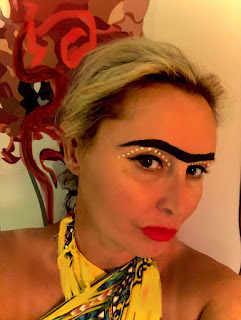
For many authors, editorial and proofreading works are a nightmare, because they often require the art of compromise to be put into practice. How do you recall the period of surrender Amenki twórczej obróbce?
Surprisingly good, because I can take criticism quite well and I can listen. For me, the most important thing is that the book is well written and readable. It is difficult to keep distance to what you have written and often you do not see your own mistakes and a sober look of an outsider who also has experience in this field is extremely valuable. In moments when I am sure that I do not want changes, I stand firm, trying to justify it as best as I can, and so far I have not met with resistance. Sometimes I surprise myself how much I can compromise. I assume, however, that this is not a skirmish, but a game to the same goal.
I know that you are already working like an ant on new projects. Could you take a peek at the mystery, revealing the secrets hidden on a computer disk?
Maybe I'll start by saying that I have essentially two new volumes ready, each with about 120 poems: Yellow and I Am Not Here. However, since I prioritized this novel, their publication has to wait. Nevertheless, I think the right moment is approaching to publish at least one of them because I consider poetry to be on par with prose, and I don't want to neglect either of them.
At the same time, I'm writing another novel titled The Marsh, set in the vicinity of Nowogródek in 17th-century Lithuania. I will just add that the village of that time, the multicultural city, the surrounding marshes, and the magic that accumulated around the cottages of village midwives, healers, seers, Jewish Kabbalists, or Cossack fortune-tellers will be permeated with the scent of herbs, freshly baked bread, and blood.
What could I wish you?
I always say that health and love, because I will try to take care of the rest myself.
So that's what I want the most.
In a final word to the readers, I would like to say one more thing…
I thank my readers for being my readers, for supporting me, for knowing quotes from the book, my poems, and often even their titles, which I can't boast about. Thank you, because thanks to them I can create stories, create other worlds and rock in the clouds. I've been doing it for as long as I can remember, but now I can do it with impunity. In fact, sometimes I feel like a fictional character myself, but that would be too beautiful...
Thank you for the nice conversation and your time.
Bianka Kunicka-Chudzikowska was interviewed by Iwona Niezgoda, the initiator and organizer of the independent "Brakująca Litera" (Missing Letter) contest for Polish Book of the Year, and the author of the blog "Góralka Czyta."
Editor in Chief: Barbara Demuth-Garbień
Reportage: Iwona Niezgoda
